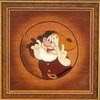That the Vatican has instructed that the proper name of God (Yahweh, and it's variations such as Jehovah), be removed from Catholic liturgies is, in some senses old news.
Naturally this extends to all prayers, readings, and songs, but for the english speaking world I suspect the biggest impact of this directive will be on the use of Dan Schutte's song 'You are near'.
While it is a simple matter to substitute a few words to remove Yahweh from a song (the 'official' revision for 'You are near' substitutes 'O Lord' for 'Yahweh'), changing the words on paper (or overhead projection system) is a lot easier than changing them inside one's own head. Just think of those prayers, and songs that have had changes imposed upon them for reasons of 'political correctness' or 'modernisation'.
Most people to greater or lesser extents, when they are actually 'singing' at Church, (as opposed to miming or mumbling in time with the music) tend to sing from memory, with the text, if used at all, used as an aid for their memory rather than reading each word and singing it.
With this in mind, it is not hard to imagine people getting to the third chorus of 'You are near' and belting out 'Yahweh' from memory, even though the new revised text might be right in front of their noses.
This is where we get to the crux of the matter. If it is not hard to imagine someone doing something they are not supposed to do, as a result of choosing to play a given song as part of the liturgy, then playing said song poses a 'occasion of sin' for such a person. Given that other song choices exist, it is voluntary (on the part of the person choosing music for the liturgy). Thus the proximity (or likelyhood) of the sin needs to be a major consideration for any in charge of choosing the music for a given liturgical celebration.
Each Sunday, in the Lord's Prayer Catholics pray 'lead us not into temptation', let us hope that our music leaders are listening!
Saturday, October 25, 2008
Subscribe to:
Post Comments (Atom)


No comments:
Post a Comment